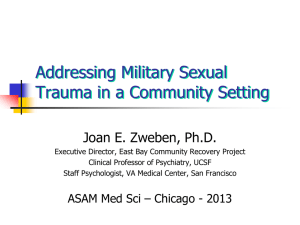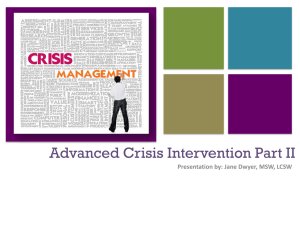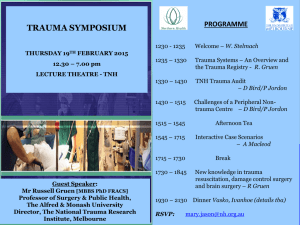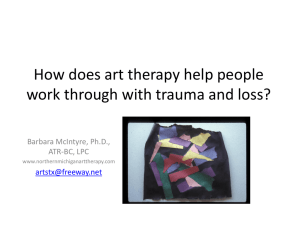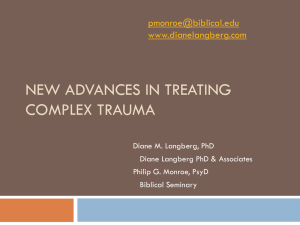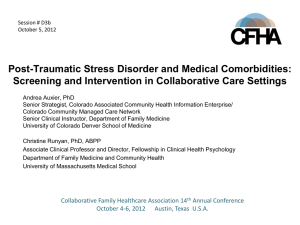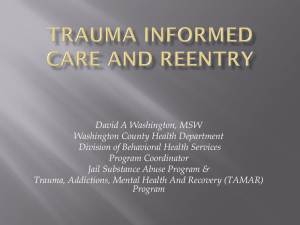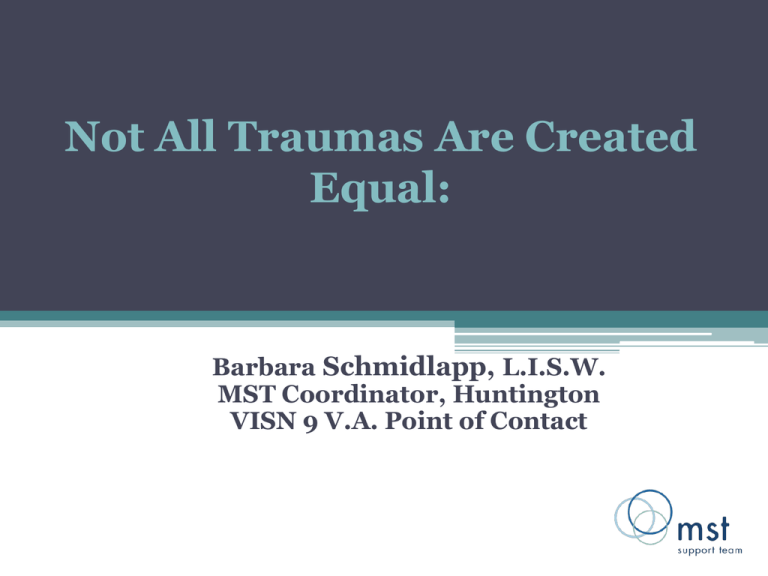
Not All Traumas Are Created
Equal:
Barbara Schmidlapp, L.I.S.W.
MST Coordinator, Huntington
VISN 9 V.A. Point of Contact
What Is Military Sexual Trauma
(MST)?
• Definition in US Code (federal law):
“Psychological trauma, which in the judgment of a
mental health professional employed by the Department,
resulted from a physical assault of a sexual nature,
battery of a sexual nature, or sexual harassment
[“repeated, unsolicited verbal or physical
contact of a sexual nature which is threatening
in character”] that occurred while a veteran was
serving on active duty or active duty for training.”
Title 38 US Code 1720D
What Is MST? (cont.)
• Any sort of sexual activity in which someone is
involved against his or her will.
• Someone may be…
▫ Pressured into sexual activities (e.g., with
threats of consequences; with implied better
treatment; “command rape”)
▫ Unable to consent to sexual activities (e.g.,
intoxicated)
▫ Physically forced into participation
As a result of national policies
and programs
• All Veterans seen in VA healthcare are screened
whether they experienced MST
• All treatment for physical and mental health
conditions related to experiences of MST is free
for both men and women (this includes
pharmacological services.)
As a result of national policies
and programs
• Every VA healthcare facility has a designated
MST Coordinator who serves as a contact person
for MST–related issues.
• Because of the high ratio of men to women in the
military, there are about comparable numbers of
men and women seen in VA who have
experienced MST with only slightly fewer men
than women.
• 22% women and 1%men
Eligibility for Care
• They do not need to have reported the
incident(s) when they happened or have other
documentation that they occurred.
Eligibility for Care
• Veterans may be able to receive this benefit even
if they are not eligible for other VA care.
• It’s important to know that Veterans do not need
to be service connected to receive free,
confidential treatment for mental and physical
health conditions related to MST.
Eligibility for Care
• Incidents occurred while on active duty or active duty for
training
• Includes Reservists and members of the National Guard
• Independent of VBA claims process
▫ Eligibility accrues as a result of events incurred in
service
▫ No length of service requirements
• No income requirements
• Veterans who received an other than honorable
discharge may be able to receive care with VBA Regional
Office approval
MST and Medical
Comorbidity
Mary Koss’s (1992) research found that
women with sexual trauma histories had
more physical symptoms across nearly all
body systems than women without histories
of sexual trauma.
Women with sexual trauma histories make
twice as many physician visits as women
without histories of sexual trauma.
SARA
• http://www.ptsd.va.gov/apps/AboutFace/vetera
ns/cpt-sarah-c-humphries/who-i-am.html
Sexual Trauma and
Healthcare Utilization
• Typically, patients with a sexual trauma history
present to medical providers, not mental health
providers.
Medical Exams
Medical examinations that are most likely to
trigger strong reactions in sexual trauma
survivors include:
Pelvic (gynecological) exams, pap smears
Rectal exams
Vaginal ultrasound
Breast exams/mammograms
Colonoscopies
Endoscopies
Urological examinations
Managing the Disclosure
Process
• It is important that providers respond to
disclosures in a nonjudgmental, affirming
manner.
“First, Do No Harm”
Response of Others to Sexual
Assault
Therapeutic Responses
Respect
Empathy
Support
Patient Perceptions
accepted
Education
Clinician Competence
Triage – assess safety
Harmful Responses
Disbelief
Distancing
Attributing assault to victim
behavior
Trivializing emotional
reactions
Encouraging forgetting
Ridicule or harassment
Prejudicial assumptions
Managing the Disclosure
Process
•
•
•
•
Patients show a range of disclosure styles.
Flat affect
Nervous laughter
Disclosing full details
Managing the Disclosure
Process
LIMIT the DISCLOSURE PROCESS
Steps after disclosure
•
•
•
•
Validation and empathy
Education
Assessment of current status and safety
Assessment of support
• Check in with him and how he/she is feeling.
Offer to have him/her call if he/she feels the
need after disclosure.
Validation and empathy
• Validation and Empathy
"I’m sorry that you experienced sexual trauma
while in the military."
Education
• "Many Veterans have experienced sexual trauma
while serving in the military. We have staff who
specialize in MST and would be able to help
you.”
Assessment of Support Level
• "Have you been able to discuss this with anyone
previously
Elements of Sexual Trauma
Psychotherapy
MST is an Interpersonal Trauma
• Perpetrated by another human being
▫ Often by a close friend/intimate partner
▫ Involves a profound violation of boundaries and personal
integrity
▫ Sends confusing messages about what is acceptable and
expected behavior from a trusted other, what rights/needs the
victim has, and what is “theirs” versus publicly available
• May be particularly confusing in the military context
▫ May have expected others to be “soldiers in arms”
• Has significant implications for survivors’ subsequent
relationships and understanding of themselves
MST May Be Ongoing Over Time
• In the military, there are often few boundaries
between work and home life and in both spheres
individuals may interact with the same group of
people
▫ Survivors may continue to have interactions with
their perpetrator
▫ May be ongoing potential for revictimization
• Can increase feelings of helplessness and of
being trapped
• Parallels with childhood abuse
Sexual Trauma That Occurs in
Military Settings Unique due to:
• MST occurs in a setting where the victim lives
and works
▫ Increased feelings of entrapment, powerlessness,
& risk of revictimization
▫ Need to rely on perpetrators for basic needs
▫ Disruption of career goals
• Particular aspects of military culture
compound feelings of helplessness and betrayal
• Typically considered to be a complex trauma
Experiences that are even more psychologically
destructive than “simple” traumas
Social Support May Be Limited
• At the time of experiences, may be far from friends
and family
• May be reluctant to report experiences to
authorities
▫ Experience of OEF/OIF Veterans may be different
due to DoD reforms
• At homecoming or discharge, may believe or be
told by others that their experiences are not as
“legitimate” as combat trauma experiences
Social Support May Be Limited
• May be reluctant to disclose experiences to
loved ones or healthcare providers, limiting
important opportunities to receive support
• May believe that treatment programs targeted
at returning veterans will not welcome them
• Problematic given research identifying social
support as the most consistent and best
predictor of recovery after trauma
How is Sexual Trauma that Occurs in Military
Settings Unique?
• Survivors are particularly vulnerable
▫ Young in age (increased risk factor for MST if 19
or younger at time of enlistment)
▫ May be away from home and support network for
the first time
Additional Complicating Factors:
Age / Developmental Level
• Leaves vulnerable to developing mental health
and other difficulties
• May draw on less developmentally advanced
coping strategies such as dissociation, behavioral
acting out, or cutting or other forms of self-harm
that themselves impair functioning and health
How is Sexual Trauma that Occurs in Military
Settings Unique?
• Particular aspects of military culture compound
feelings of helplessness and betrayal
▫ Power differential due to frequency of higher rank
in perpetrator compared to victim
▫ Victim cannot escape by choosing to leave or
change jobs
▫ Difficulty reporting if perpetrator is in chain of
command
How is Sexual Trauma that Occurs in Military
Settings Unique?
• Violation of sense of trust
▫ Command supposed to take care of troopsviolated if perpetrator is in chain of command or if
chain of command does not respond
▫ Expectation of respect and trust for those of
higher rank violated if perpetrator is of higher
rank
▫ Violation of sense of safety-military base as high
security and safe
How is Sexual Trauma that Occurs in
Military Settings Unique?
• High value on loyalty and teamwork
▫ Taboo to divulge negative info about peers
▫ MST is that much more incomprehensible to victim
▫ High value placed on strength and self-sufficiency
reduces social support available and increases
likelihood of invalidating responses
being a victim conflicts with desired identity-”Army
Strong”
Threat of death if report is real-peers trained to kill in
combat, threat of “accidents” on firing range
How is Sexual Trauma that Occurs in Military
Settings Unique?
• Response is often minimal or punitive to victim
▫ 90% of rapists never court-martialed
▫ Victim who reports is accused of breaking up their
unit or hurting esprit de corps
▫ Victim may be the one transferred, may be
branded as “trouble-maker”
MICHELLE
• http://www.ptsd.va.gov/apps/AboutFace/vete
rans/michelle-rentas/who-i-am.html
Continuum of Severity
▫ Anything in the trauma, the person or the
context that: makes the emotions more intense
▫ makes the meanings more confusing or upsetting
▫ will make the trauma more severe or “complex”
Why Look At Complex
Trauma?
• Complex trauma is associated with a more
confusing array of responses
• Military Sexual Trauma (MST) is often a
complex trauma
• Understanding complex trauma sheds light on
confusing behaviors
Additional Complicating Factors:
Other Experiences of Trauma
• High rates of childhood and premilitary trauma among
MST survivors and military personnel more generally
• Concurrent exposure to combat among OEF/OIF
Veterans
• Research has shown that exposure to multiple types of
trauma increases the risk of negative mental health
outcomes
Effects of trauma appear to be dose-specific—the more
traumas or the worse the trauma, the worse the outcome
Aftereffects of earlier trauma (e.g., poor social support;
self-blame) may impair ability to cope with later trauma
Complex Trauma vs. PTSD
• •Complex Trauma refers to multiple and ongoing stress, originally ,primarily experienced in
childhood and adolescence but now MST is
being viewed as a complex trauma.
• •The impact of complex trauma may not mirror
the symptoms of PTSD,
Complex Trauma
• “Complex trauma generally refers to traumatic
stressors that are interpersonal, that is, they
are premeditated, planned, and caused by
other humans, such as violating and/or
exploitation of another person.” (Christine A.
Courtois, PhD)
What makes trauma ‘worse’?
• Interpersonal
• Age (early or late in development)
• Repetition
• Violence (subjective life threat)
Entrapment Creates
•
•
•
•
An ongoing traumatic situation
Repeated exposure to trauma
An inability to get safe
Intense, chronic helplessness, terror, and dread
▫ Unrelenting physiological arousal
• Dependency upon the perpetrator
▫ Increased risk of internalizing the perpetrators
views
The necessity of not knowing what you know
Intolerable meanings Dissociation is inevitable
PTSD
• •A diagnosis of PTSD may result from a single
event at anytime in the lifecycle.
• •A diagnosis PTSD is limited to specific
symptom criteria, including re-experiencing,
avoidance, and increased arousal.
Definition of Complex Trauma
Prolonged exposure to repeated or multiple traumatic
events
From which escape is not possible due to environmental,
social, psychological, maturational forces
Typically of an interpersonal nature
Often reported about but does not necessarily only occur
in early life
Examples Complex Trauma
•
•
•
•
•
•
•
childhood abuse
domestic violence
prisoners of war/MST
slave-trade
sex trafficking
torture
exposure to genocide or other forms of organized
violence
Core Characteristics of Complex Trauma: Impact on Self
Concept
Repeated violations of the body is often accompanied by a
dehumanization of the person
CPA – “I was a punching bag”
CSA - “I was a sexual object “
Torture - ”I was no longer human”
Genocide – “I, my people, were vermin to be eradicated”
Repeated bodily violations in the context of abrogated personhood
leads to the degeneration of the capacity for self-organization (or in
the case of children, disturbs the development of these capacities)
The ISTSS ( International Society
of Traumatic Stress Studies) task
force definition of Complex PTSD
included the core symptoms of
PTSD (re-experiencing,
avoidance/numbing, and hyperarousal) in conjunction with a
range of ISTSS Expert Consensus
Guidelines for Complex PTSD
November 2012
ICD-11 Complex PTSD
PTSD
Disturbances in Emotions: Affect Dysregulation - heightened
emotional reactivity, violent outbursts, impulsive or reckless
behaviors
Disturbances in Self: “Defeated/Diminished” Self - marked by
feeling diminished, defeated and worthless, feelings of shame,
guilt, or despair (extends despair)
Disturbances in Relationships - marked by difficulties in feeling
close to others, having little interest in relationships or social
engagement more generally. There may be occasional
relationships but the person has difficulty sustaining them.
(combines and extends detachment and social withdrawal)
Van der Kolk, Roth, Pelcovitz et al (2005) Journal of Traumatic Stress
Cloitre, Courtois, Charuvastra et al (2011) Journal of Traumatic Stress
Relevance to Women Veterans with
MST
Concept applicable to Women with MST?
Frequently have experience chronic early life or
premilitary trauma (Kelly et al, 2011; Suris & Lind,
2008)
Typical symptom profile is complex PTSD or PTSD
plus multiple comorbid symptoms (Allard et al,
2011; Kimerling et al, 2007, Kimerling et al,2010;
Luterek et al, 2011; Suris et al, 2004; Suris et al,
2007)
Commonly worry about social and role
functioning, including coping with re-integration
(Mattocks et al, 2012; Street et al, 2009)
Elements of Sexual Trauma
Psychotherapy
• Addressing immediate health and safety
concerns
• Normalizing post–trauma reactions by
providing education about trauma and
psychological reactions to traumatic events
• Providing the Veteran with validation
Given the limited empirical literature
ISTSS initiated an expert consensus survey to
provide opinion about…
What constitute best practices in the treatment
of Complex PTSD?
Cloitre et al (2011) Treatment of Complex PTSD: Results of the ISTSS Expert Clinician S
of Best Practices, Journal of Traumatic Stress, 24, 615-627.
Multi Phase treatment
• Phase 1. Safety, Stabilization, symptom
reduction, skills building and development of
treatment alliance
• Phase 2. Integration of traumatic memories
• Phase 3. Personality (re) integration and (re)
habilitation
▫ Not linear, careful pacing
Phase 1
• SAFETY AND STABILIZATION
Moving from survival brain to learning brain
Safety , Stabilization & Skill
building
• Environment
▫ Housing/ Food Clothing Shelter
▫ Family/friend support etc
• Internal
▫ Emotional regulation
▫ Interpersonal self -regulation
Going for Treatment
• http://maketheconnection.net/conditions/milit
ary-sexual-trauma
Resources the V.A. uses
• Seeking Safety- Treatment for PTSD and
Substance abuse- Lisa Najavits
• STAIR.- Skills Training In Affect and
Interpersonal Regulation - Marylene Cloitre,
PhD
• Others : Acceptance and Commitment
Therapy etc. Anger groups etc.
Phase 2 Emotional Processing
of the Trauma
•
•
•
•
Evidence Based Therapies
Prolonged Exposure (P.E.)
Cognitive Processing Therapy ( CPT)
EMDR Eye Movement Desensitization
Reprocessing
• Others – CBT-I, IRT ACT
Phase 3 Integration
• Integration of learning and increased adaptive
living.
SHERIE
• http://www.ptsd.va.gov/apps/AboutFace/vete
rans/sheri-warner/who-i-am.html\
PTSD COACH on line and APP
• http://www.ptsd.va.gov/PTSD/public/pages/pts
d_coach_online.asp
Information resources
• On the VA Intranet: MST Resource Homepage.
Copy and paste this link into your browser to
view this site. http://vaww.mst.va.gov
• On the Internet: VA Office of Mental Health
Services MST Webpage
(http://www.mentalhealth.va.gov/msthome.asp
MST COORDINATORS
TENNESSEE
• Memphis :Latrice Thomas, M.S.W. (901) 5238990 x5357
• Mountain Home: Glenda Short, Ph.D., MSW,
(423) 926-1171 x7721
MST COORDINATORS
TENNESSEE
• Tennessee Valley HCS :Michele Panucci, Ph.D.
(615) 873-6110
• Tennessee Valley HCS Heather Farrow, Ph.D.
• (615) 225-3444
• It was really cyclical actually…and the odd
thing was that in the good periods I could
hardly remember the bad times. It was
almost as if I was leading two different
lives“
• Quote from Woman who experienced domestic
violence quoted in Judith Herman’s Trauma and
Recovery, 1992.
HYPERLINKS
• http://www.ptsd.va.gov/apps/AboutFace/vetera
ns/cpt-sarah-c-humphries/who-i-am.html
• http://www.ptsd.va.gov/apps/AboutFace/vetera
ns/michelle-rentas/who-i-am.html
• http://maketheconnection.net/conditions/milit
ary-sexual-trauma
HYPERLINKS
• http://www.ptsd.va.gov/apps/AboutFace/vetera
ns/sheri-warner/who-i-am.html\
• http://www.ptsd.va.gov/PTSD/public/pages/pts
d_coach_online.asp

